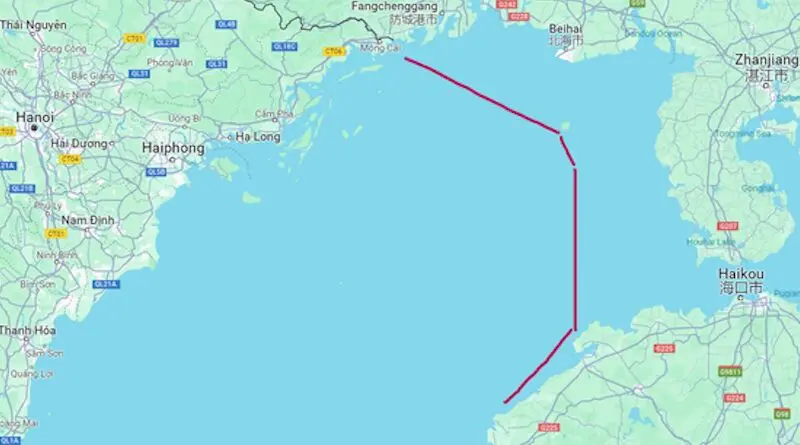
Vietnam has requested that China respect international law and bilateral agreements with Hanoi after Beijing drew a new baseline in the Gulf of Tonkin.
The baseline is deemed as “excessive” by analysts, with one suggesting the United States should conduct a freedom of navigation operation to challenge it.
Radio Free Asia, a news service affiliated with BenarNews, was the first Western media to report the announcement earlier this month of a new baseline that defines China’s territory in the northern part of the area known in China as the Beibu Gulf.
This baseline, which Beijing said was set in accordance with Chinese law, did not exist before.
On Thursday, Vietnamese foreign ministry spokeswoman Pham Thu Hang said that “all coastal countries need to abide by the 1982 U.N. Convention on the Law of the Sea (UNCLOS)” when drawing the territorial baseline used to calculate the width of the territorial waters and other maritime zones.
She highlighted the necessity for these baselines to not affect the lawful rights and interests of other countries, including the freedom of navigation and the freedom of transit passage through straits used for international maritime activities.
The spokeswoman stopped short of rejecting the new Chinese baseline and instead called on Beijing to “respect and abide by the agreement on the delimitation of the territorial seas, exclusive economic zones and continental shelves of the two countries in the Gulf of Tonkin signed in 2000, as well as the 1982 UNCLOS.”
Beijing has yet to respond to Hanoi’s statement but the Chinese foreign ministry’s Department of Boundary and Ocean Affairs said on its official WeChat account earlier that the announcement of the baseline was a necessary act to exercise national sovereignty and jurisdiction.
Encroachment
The Gulf of Tonkin, or Vinh Bac Bo in Vietnamese, is highly important to both Vietnam and China not only in terms of economic development but also defense and security.
After nine years of negotiation, Hanoi and Beijing signed a Maritime Boundary Delimitation Agreement in 2000 to clearly demarcate each other’s territorial seas, exclusive economic zones and continental shelves in the Gulf of Tonkin.
Some analysts said the new baseline would not affect Vietnam’s economic interests much as long as the signed agreement is observed. Others are concerned that Beijing would use it as a pretext to push Hanoi to renegotiate the boundary agreement.
“China’s announcement of its baseline in the Gulf of Tonkin is a step up the ladder of escalation in its strategy of ratcheting up assertiveness in the South China Sea,” said Alexander Vuving, a professor at the Daniel K. Inouye Asia-Pacific Center for Security Studies in Hawaii.
“The new baseline puts Vietnam’s before a fait accompli,” he said, “It gives reasons for China to question the agreement that Beijing and Hanoi signed off in 2000 and push the boundary closer to the Vietnamese coast.”
UNCLOS stipulates that the drawing of straight baselines “must not depart to any appreciable extent from the general direction of the coast, and the sea areas lying within the lines must be sufficiently closely linked to the land domain to be subject to the regime of internal waters.”
The new Chinese baseline at some points encroaches about 50 nautical miles (93 km) on international waters and on average, “it represents an encroachment of 20 to 30 nautical miles upon international waters,” Vuving said.
“China’s baseline in the Tonkin Gulf is not in line with UNCLOS and can be rejected by an international court.”
Challenging China’s claims
“China’s unilateral creeping excessive claims in other countries’ maritime and territorial domains even while a border resolution instrument is in existence, are becoming a regular event,” said Pooja Bhatt, an independent maritime security analyst.
Vietnam, as well as other countries in the same situation, should protest against this move, raise the issue at the bilateral level and bring international attention to it, she said.
“Keeping silent to save immediate Chinese backlash will harm countries’ future territorial integrity and national interests,” she said.
The new expansive baseline would affect freedom of navigation activities in the area as no foreign ships or aircraft are allowed to make so-called innocent passage through a country’s internal waters inside the baseline.
China also requires permission or notification before a foreign warship can sail through its territorial sea, measured 12 nautical miles outward from the baseline. Beijing has repeatedly protested against U.S. warships’ sailing in waters near the Paracel and Spratly archipelagos, which Washington insists is conducted in accordance with international law.
Vuving suggested that several other countries may dispute China’s new baseline and the U.S. “may conduct a freedom of navigation operation to physically challenge China’s excessive claims.”
No comments:
Post a Comment